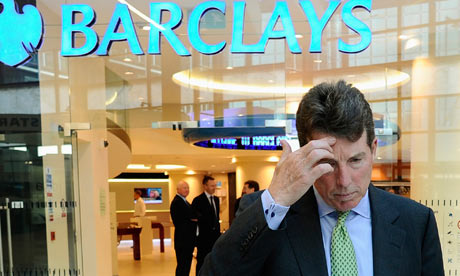The reality was that Thatcher was neither popular nor successful economically. Labour must make a clean break with her policies

A North Sea oil rig off the Scottish Coast, pictured in 1988: 'During Thatcher's time in office, government oil receipts amounted to 16% of GDP.' Photograph: George Steinmetz/ George Steinmetz/Corbis
It is a truism that history is written by the victors. As Margaret Thatcher's economic policies were continued after she left office, culminating in economic catastrophe in 2008, it is necessary to throw out the myths peddled about her. The first is that she was popular. The second is that she delivered economic success.
Unlike previous governments, Thatcher's never commanded anything close to a majority in a general election. The Tories' biggest share of the vote under her was less than 44% in 1979, after which her vote fell. The false assertions about her popularity are used to insist that Labour can only succeed by carrying out Tory policies. But this is untrue.
The reason for the parliamentary landslide in 1983 was not Thatcher's popularity – her share of the vote fell to 42% – but the loss of votes to the defectors of the SDP and their alliance with the Liberals. Labour's voters did not defect to the Tories, whose long-term decline continued under Thatcher.
Nor did Thatcher deliver economic success, still less "save our country" in David Cameron's silly and overblown phrase-mongering. In much more difficult circumstances in 1945, the Labour government, despite war debt, set itself the task of economic regeneration, introduced social security and pensions, built hundreds of thousands of homes and created the NHS. In the 31 years before Thatcher came to office the economy grew by about 150%; in the 31 years since, it's grown by little more than 100%.
Thatcher believed that the creation of 3 million unemployed was a price worth paying for a free market in everything except labour. Thatcher's great friend Augusto Pinochet used machine guns to control labour, whereas Thatcher used the less drastic means of anti-union laws. But their goal was the same, to reduce the share of working class income in the economy. The economic results were the reason for Thatcher's falling popularity. As the authors of The Spirit Level point out, the inequality created led to huge social ills, increases in crime, addictions of all kinds and health epidemics including mental health issues.
Thatcher's destruction of industry, combined with financial deregulation and the "big bang", began the decline of saving and accumulation of private- and public-sector debt that led directly to the banking crisis of 2008. The idea that bankers would rationally allocate resources for all our benefit was always a huge lie. Now the overwhelming majority are directly paying the price for this failed experiment through the bailout of bank shareholders.
Thatcher was sustained only by one extraordinary piece of luck. Almost the moment she stepped over the threshold of Downing Street the economy was engulfed in an oil bonanza. During her time in office, government oil receipts amounted to 16% of GDP. But instead of using this windfall to boost investment for longer-term prosperity, it was used for tax cuts. Public investment was slashed. By the end of her time in office the military budget vastly exceeded net public investment.
This slump in investment, and the associated destruction of manufacturing and jobs, is the disastrous economic and social legacy of Thatcherism. Production was replaced by banking. House-building gave way to estate agency. The substitute for decent jobs was welfare. Until there is a break with that legacy there can be no serious rebuilding of Britain's economy.
The current economic crisis is already one year longer than the one Thatcher created in the early 1980s. In effect the policies are the same now, but there is no new oil to come to the rescue.
Labour will win the next election due to the decline in Tory support, which is even lower under Cameron than Thatcher. But Labour must come to office with an economic policy able to rebuild the British economy – which means a clean break with the economic policies of Thatcher. Labour can build an alliance of the overwhelming majority struggling under austerity: a political coalition to redirect resources towards investment and sustainable prosperity using all the available levers of government.
We can succeed by rejecting Thatcherism – the politics and economics of decline and failure.





